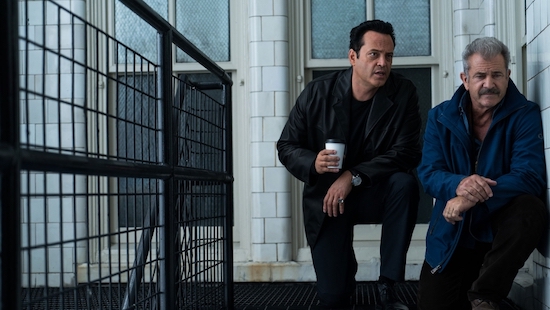It is not always entirely clear what, if any, political motives S. Craig Zahler uses to frame his work, but when this sprawling, muscular mass of cinematic text is fronted by the ultimate hardline Hollywood conservative, Mel Gibson, it becomes harder to ignore the political implications.
Dragged Across Concrete is the third directorial outing from Zahler, and his fifth writing project. It tells the story of Brett Ridgeman (Mel Gibson) and Anthony Lurasetti (Vince Vaughn), two police officers who are suspended with unpaid leave for using unnecessary force and are forced to delve into the criminal underworld for a quick buck.
Zahler’s films are known for their unflinching violence, but what is fascinating about his approach to it is the precision. In Dragged, every bullet has a specific purpose, every shot inflicts a detailed injury and propels the plot. It all comes down to an intense stand-off during the third act with moments where the tension holds just long enough that crucial actions become blink-and-you’ll-miss-them. It’s unlike anything I’m seeing at the moment, and in many ways is an antidote to the current trend of trigger-happy gunfights that end up as little more than scene padding.
The same can be said for how he frames gore. There is a scene in Zahler’s 2015 film Bone Tomahawk which is obscenely anatomical in such a singular way, and it’s so much more disturbing than the usual camp of slasher horror. There are some less extreme elements of that technique in this film: the whistling breath of someone shot through the chest, or an impromptu dissection in the back of a van. The gore in Dragged Across Concrete always has purpose, even if it is simply to devastate – as in one beautifully set-up bank robbery scene.
Stories with a conservative edge are not as well-favoured in Hollywood as they once were. The threat posed to liberal America by the current president has accelerated a growing awareness of the need for diversity and inclusivity in mainstream cinema. Recent police procedural films such as End of Watch focus on the do-gooders in American law enforcement. Or conversely, like in Kathryn Bigelow’s Detroit, they use real-life events to unveil the deepest depths of corruption within the force. It’s rare to find a film that devotes its energy to two such unsympathetic protagonists – and even rarer to find one that appears to coast through the subject of police violence without taking a stance on it.
Ridgeman is convinced that despite doing “honest work” he has never risen above a certain rank because of the “liberal agenda”. Meanwhile, smooth-talking Lieutenant Calvert (Don Johnson) is now his superior where once they were equal, because Calvert “played the game”. But the scene where we are introduced to the officers shows just how malicious Ridgeman is when performing his duties, even if the film’s official synopsis merely uses the word “overzealous”. He unnecessarily grinds his boot into the man’s neck, after which he throws water at the suspect’s partially-deaf girlfriend and turns the ceiling fans on full power to intimidate her with mild torture. In the age of social media and the ability to broadcast police brutality to a wide internet audience, the community is wise to this kind of behaviour. The situation with the suspect is recorded on camera. Ridgeman and Lurasetti are suspended from duty until further notice, without pay.
Herein lies the fallacy – Ridgeman believes the world is unfair and that the “liberal agenda” is out to get him. But he abused his position of power while doing his job. His wife claims she never thought she’d become a racist but “the neighbourhood” has made her so. These characters don’t consider that a white cop abusing racial minorities in the job he’s paid to do by taxpayers could contribute to antagonistic behaviour in the streets. Ridgeman acts out, but those who retaliate are condemned for doing so.
The mystery remains as to whether Zahler is critiquing these characters or sympathising with them. We are shown that Officer Ridgeman’s life is not easy – his wife has early stage MS and his daughter is deeply unhappy, and this humanises him while pulling focus to the financial urgency of his unpaid leave. But he is nevertheless a morally corrupt police officer, and his actions only feed into continued civil unrest, as the film demonstrates. Not only that, but he is played by one of the most infamously conservative actors in Hollywood, whose beliefs and outbursts have caused endless controversy.
It does seem on some level a mockingly deliberate decision to have a character so adverse to atoning for his actions be played by a man who famously and unapologetically upholds offensive beliefs. In this way the film hangs in a political balance: it can attract audiences from across the political spectrum, all of whom will leave the cinema with varying opinions. Such is the way when a film forthrightly uses conservative tropes without clearly or succinctly using the plot to either reaffirm or undermine them.
Weighing in at 2 hours and 39 minutes long, Dragged Across Concrete lived up to its name at times, rumbling along stolidly with protracted periods of dialogue in between bursts of violence. Vaughn is as deeply uncharismatic as ever, whereas Gibson is on good form with his delivery and timing. But for such a long film, even with its decent pacing, it doesn’t seem to have anything to say about the violence it utilises, or about society, or even about politics. There are big themes in this film which remain resolutely domestic. In the end, it was left sadly forgettable. Aside from the well-orchestrated violence, nothing really jumped out at me in this film. Hopefully Zahler can add more dimensions to his work in his upcoming projects.
Dragged Across Concrete, directed by S. Craig Zahler, is in UK cinemas now



